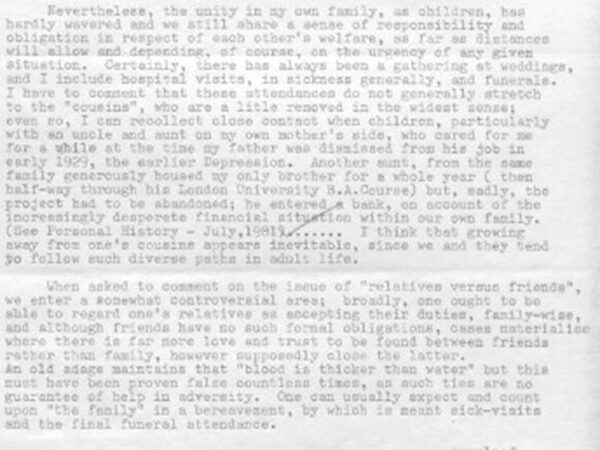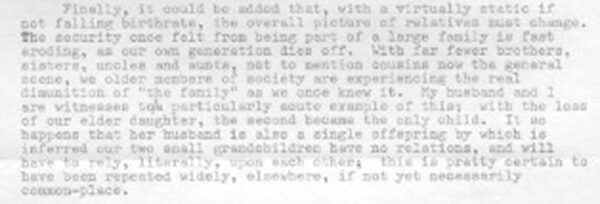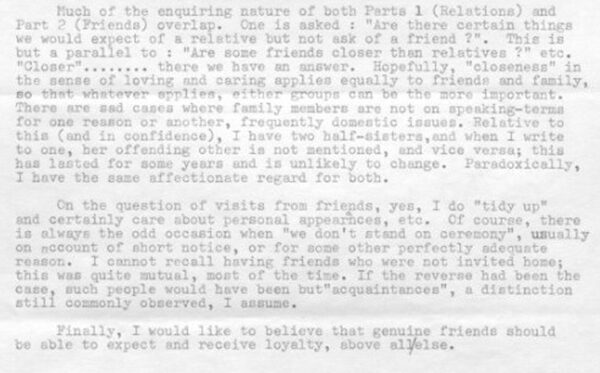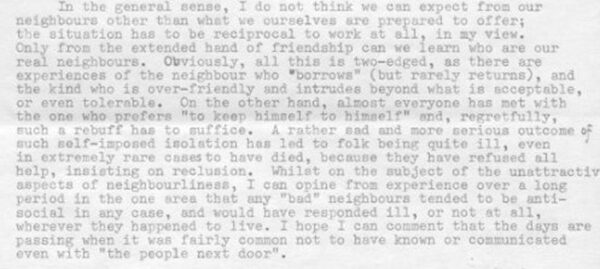Is blood thicker than water? Friends, relatives and neighbours from the Mass Observation Project
“An old adage maintains that 'blood is thicker than water' but this must have been proven false countless times, as such ties are no guarantee of help in adversity.”Old friends, neighbours and relatives are at the centre of our support networks – particularly in times of adversity.
This was the topic that participants in the Mass Observation Project, 1981-2009 were asked to write about in the winter of 1984. How would they weigh up ‘relatives versus friends’? An imposing question if you were asked in the street by a complete stranger, or by someone in a bar that has had one too many, but when anonymised, it is surprising how forthcoming we can be with our views.

Image © Mass Observation at the University of Sussex Special Collections. Further reproduction is prohibited without permission.
The quote above came from respondent M372’s account. Her five pages are incredibly heartfelt and insightful into their experiences with her family, friends, and neighbours. With relatives, she comments that “Certainly, there has always been a gathering at weddings, and I include hospital visits, in sickness generally, and funerals” noting that with the “falling birthrate… we older members of society are experiencing the real diminution of “the family” as we once knew it.”
Discussing her friends, she comments on how they can often be closer than relatives, adding “I would like to believe that genuine friends should be able to expect and receive loyalty, above all/else.”

Image © Mass Observation at the University of Sussex Special Collections. Further reproduction is prohibited without permission.

Image © Mass Observation at the University of Sussex Special Collections. Further reproduction is prohibited without permission.
But most beautifully, our writer explains how “Hopefully, 'closeness' in the sense of loving and caring equally applies to friends and family so that whatever applies, either groups can be the more important.”
How that sentiment remains relevant today: some families are close, while others consider their friends to be their family. For some, their neighbourhood is their community and their life - though M372 would disagree, noting:
I do not think we can expect from our neighbours other than what we ourselves are prepared to offer… Each to their own!

Image © Mass Observation at the University of Sussex Special Collections. Further reproduction is prohibited without permission.
One nugget in particular brings a smile to my face. Our writer confirms in her account that for:
…visits from friends, yes, I do 'tidy up' and certainly care…
I can recall episodes from my own childhood where in the hours leading up to the grand reception of friends and family, my mother would be screaming up the stairs, Dyson in hand, about all the cleaning, still required. God forbid we allow those closest to us to see our home as though it is actually lived in.
For more information about Mass Observation project, 1981-2009, including booking a demo and price enquiries, please email us at info@amdigital.co.uk.
Recent posts

The blog highlights American Committee on Africa, module II's rich documentation of anti-apartheid activism, focusing on the National Peace Accord, global solidarity, and student-led divestment campaigns. It explores the pivotal role of universities, protests, and public education in pressuring institutions to divest from apartheid, shaping global attitudes toward social justice and reform.

This blog examines how primary sources can be used to trace the impact of young voices on society, particularly during pivotal voting reforms in the UK and the US. Explore materials that reveal insights into youth activism, intergenerational gaps, and societal perceptions, highlighting their interdisciplinary value for studying youth culture, activism, and girlhood across history.
